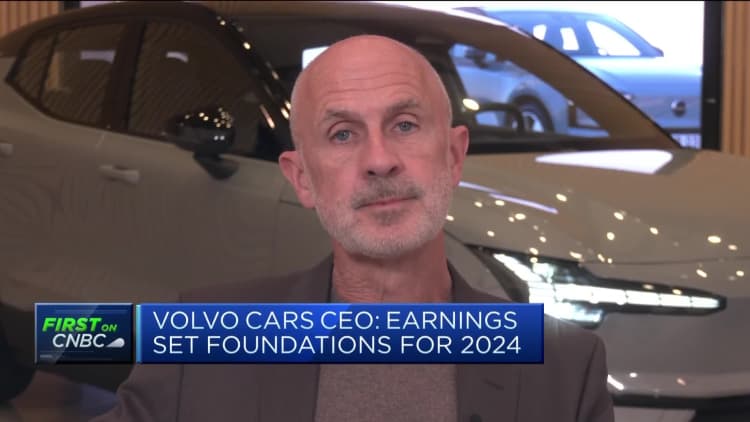
04 Apr Volvo Cars up 6% on record monthly sales despite China EV slowdown
Volvo’s EX90 electric vehicle photographed in Sweden on Nov.9, 2022.
Mikael Sjoberg | Bloomberg | Getty Images
Sweden’s Volvo Cars on Thursday climbed to its highest level since November, after the automaker reported record single-month sales for March and solid electric vehicle growth in Europe.
Shares rose by 6.2% at 12:20 p.m. in London and hit their highest level since Nov. 16, according to LSEG data.
The company, which is majority-owned by Chinese autos group Geely, sold 78,970 cars last month, up 25% year-on-year. Total first-quarter sales were up 12% annually, to 182,687.
Volvo Cars said its new all-electric EX30 model had boosted growth and that it would focus on ramping up sales of the vehicle in the coming months.
Year-on-year sales of electric vehicles in Europe were 22% higher in the quarter and up 34% year-on-year in March, roughly in line with overall sales growth in that market.
Sales of electric models to China, the largest EV market, dropped by 36% despite a 4% hike in overall sales.
U.S. performance was mixed for EVs, with 44% growth in hybrid vehicles but a 65% plunge in all-electric sales. Overall sales growth was 17%.
“These numbers reflect the strength of our strategy and product diversity – offering fully electric cars alongside plug-in hybrids and mild hybrids in the right mix,” Volvo Cars’ Deputy CEO Björn Annwall said in a statement.

Electric vehicle sales are being closely watched by the industry, amid debate about whether ambitious forecasts for the next-generation autos has been overblown.
In 2021, Volvo Cars announced a plan to be a “fully electric car company” by 2030, phasing out all non-electric models and hybrids. Last month it said it would dilute its stake in electric vehicle maker Polestar and “concentrate its resources on the next phase of its transformation.”
A range of automakers including Ford Motor, Mercedes-Benz and Volkswagen have scaled back their EV strategies over the last year as doubt grows about consumer appetite for all-electric models.
